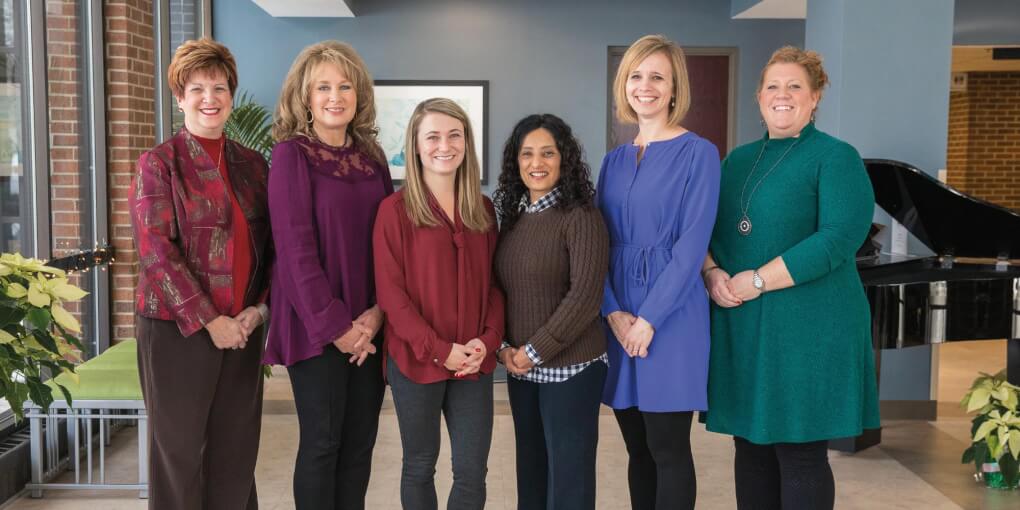A Grand Valley nursing alumna successfully obtained a $400,000 grant to expand Spectrum Health's hospice and palliative care services within the community.
The Spectrum Health Foundation grant is one of many positive outcomes of a unique collaboration between the Kirkhof College of Nursing and Dr. Simin Beg, chief of hospice and palliative care services for Spectrum Health
Rachel Cardosa was the first of three Doctor of Nursing Practice (DNP) students from Grand Valley who were placed in Beg's office for a clinical immersion rotation. Cardosa took a project she started as a doctoral student and turned it into the successful grant application.
"A big part of the project was collecting data on patients who were not able to be serviced to help identify why we needed to expand the program," said Cardosa, who earned a DNP degree in 2016 and works as a nurse practitioner for Spectrum Hospice and Palliative Care.
In particular, Cardosa studied patients with advanced heart failure, which she termed among the most expensive and most chronic illness. She found as many heart patients were treated at an outpatient clinic, palliative services were not forefront of mind. It meant educating physicians, patients and their families about options to enter palliative care sooner.
“As a DNP prepared nurse practitioner, I have a skill set that can immensely improve health care delivery and outcomes at the patient, community and systems levels.”
TANYA ROWERDINK
"It's having patient-centered discussions with the patients and families to learn their goals for care," she said. "Palliative care focuses on the whole person and their comfort management, to make sure their care aligns with what they want."
Dianne Conrad, associate professor of nursing, said Beg's leadership, mentorship and expertise fits well with KCON's certificate program in hospice and palliative care (see sidebar).
"Dr. Beg is an energetic and supportive practice partner, committed to her work as well as the patients and students she works with," Conrad said.
Beg was asked to be a preceptor for KCON's DNP students while she was finishing the executive MBA course through the Seidman College of Business.
"I wanted to do this, I felt it was not only beneficial for Grand Valley but had opportunities to make our division better," Beg said. "It's the perspective that DNP students bring. They have a different way of looking at systems and how best to improve patient care."
The community-based palliative care project started when Tanya Rowerdink was a DNP student in Beg's office in 2016. Rowerdink, who now works as a nurse practitioner in survivorship for the Cancer and Hematology Centers of Western Michigan, analyzed outcomes of the Medicare Care Choices Model and developed an evidence-based toolkit so the next DNP student could put it into practice.
She said the skills she developed while in Beg's office — develop, initiate and evaluate program outcomes — has set her on a path for success.
"As a DNP prepared nurse practitioner, I have a skill set that can immensely improve health care delivery and outcomes at the patient, community and systems levels," Rowerdink said.
Katlyn Gettel is currently working in Beg's office; she will graduate in April with a DNP degree. Her interest in hospice care stemmed from a family experience. "My dad died from cancer and watching his hospice nurse made me want to pursue it," Gettel said.
Gettel's project continues the work of her two predecessors, focusing on expanding services to oncology patients, another illness (like heart disease) known for delayed referrals to hospice care. She said early referrals often are cost-saving measures.
"When you look at a specific timeline of a patient, without referrals, they often end up in the ICU, emergency department or dying without hospice care," she said.
Beg said it's not unusual for physicians to be hesitant to send their patients to a palliative care specialist. "Doctors are resistant to it. Medicine is about curing and fixing patients, it's what we're trained to do; this type of medical care is counterintuitive to how we were trained," she said.
The expansion project created by Beg and three DNP students is making headway, she added. "The cardiologists are now seeing the benefits, we've earned their trust. They know that having palliative care is better for the patient. We can impact our community and have long-lasting benefits because of this partnership," Beg said.







